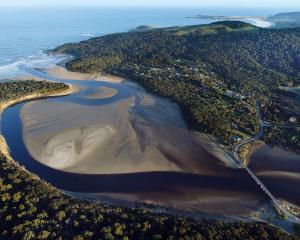
About 60 children in years 4 to 8, from Clutha schools participating in the Enviroschools programme, gathered at Balclutha’s Cross Recreation Centre to expand their knowledge of natural food and medicine, and traditional Māori games.
Leading foraging expeditions among nearby native plantings was Para Kore rongoā (natural medicine) practitioner Kane Holmes.
Mr Holmes demonstrated how useful foods and medicines could be sourced from common local plants such as harakeke (flax), tī kōuka (cabbage tree) and horopito (pepper tree).
Pia harakeke (flax gum) could be used as a wound dressing, and tī kōuka could provide a tasty source of carbohydrates.
Pupils had an opportunity to try the foraged products.
Waiwera South School principal Kaz Bissett said the children’s fascination with their place in the natural world was evident from their rapt interest in Mr Holmes’ presentation.
"Kids today have that innate feeling that they need to do something to look after their world.
"Enviroschools has a fabulous ethos, and gives a framework for actually making a difference."
To become an Enviroschool, a school had to commit to a "long-term sustainability journey", Clutha District Council Enviroschools co-ordinator Scott Martin said.
"This is an opportunity to bring together Enviroschools students from across the district for a day of hands-on activities exploring the links between Enviroschools, sustainability and hauora [health and wellbeing].
"The hui is for students to share ideas, develop leadership skills and see that they are a part of a larger movement beyond their own schools and communities."
There are 10 Enviroschools in Clutha — eight primary, one area school and one secondary school.
Pupils at the schools plan, design and lead sustainability projects in their local areas.
Last year, projects included waste audits, riparian planting, water quality testing, designing and establishing gardens, roadside clean-ups and composting food waste.
Nationally, there are 1485 Enviroschools, attended by 351,400 children.











